Fremantle Law School's Inaugural International Immersion – Phnom Penh 2017
In January 2017, sixteen students from the Fremantle School of Law at the University of Notre Dame Australia travelled to Phnom Penh for a two-week placement. The trip was supported by funding by the Department of Foreign Affairs and Trade's New Colombo Plan.
While there, they visited a range of non-government organisations (NGOs) and courts with a view to gaining an understanding of the Cambodian legal system.
Week 1
The week got off to a heavy start with visits to Tuol Sleng Genocide Museum (former S-21 Prison) and the Cheung Ek Killing Fields – sites bear witness to some of the Khmer Rouge's most horrific crimes.
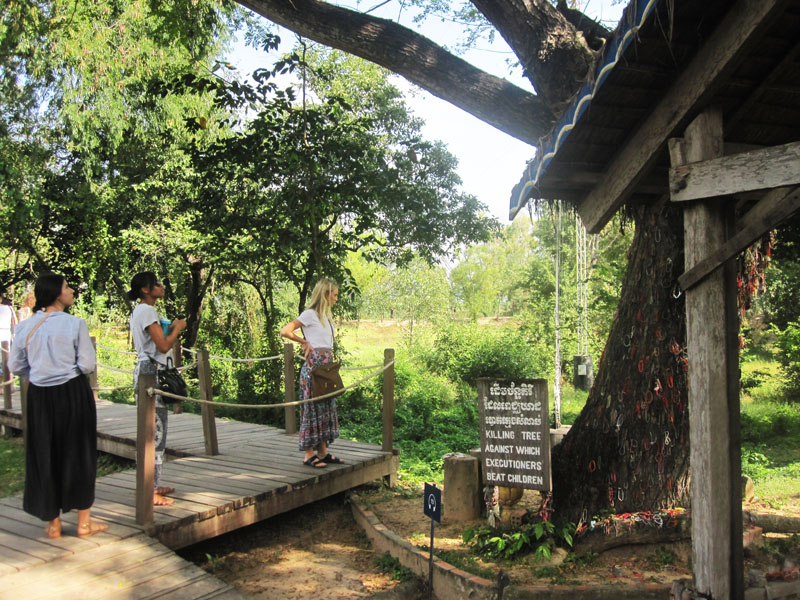
Students at the Cheung Ek Killing Fields
"Prior to visiting the killing fields and the S21 prison I felt well versed in the history of the Khmer Rouge and the severe suffering it produced. The rebel communist regime of Pol Pot began a revolutionary social system that dissolved all pre-existing social, cultural, economic and political institutions. I found this information shocking when first read in Australia, however, at the killing fields and S21 prison the severity of the crimes committed against humanity became abundantly clear and real."
Tess Dillon
"Our Tour Guide, Mr Try, described living his teenage years through the events of the Khmer Rouge Regime in the 1970s and made me realise how lucky I was. The turmoil and bloodshed that Pol Pot and his Communist regime had created was devastating.
To think that people had actually survived the torture was surreal, and this was put into reality when I met one of the survivors of the S-21 Prison, Chum Mey. Softly spoken, with a face that hid so much emotion, he told me how his skill as a mechanic had saved him after he was separated from the other prisoners and made to fix the typewriters that the other captors used to document their forced confessions."
Will Benson
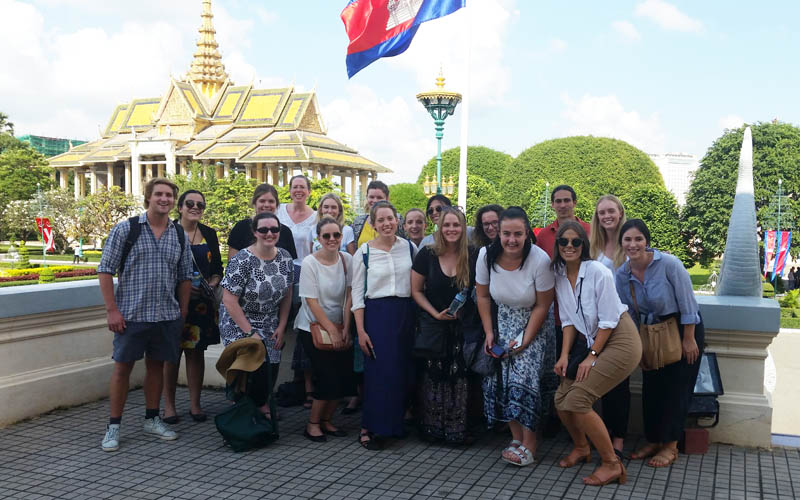
Staff and Students visit the
Royal Palace in Phnom Penh
The first day finished with a trip to the Royal Palace, a Khmer lesson and a dinner of delicious Khmer food. While our teacher Try, was less than impressed with our language skills, the wonderful afternoon and evening showed us that, while its recent history has left a scar, there is a lot more to Cambodia than the Khmer Rouge.
Over the next week we visited a range of NGOs providing legal related services.
One of the first NGOs we visited, ChildSafe International, provided students with thought-provoking information about the diverse risks faced by children in Cambodia – and how well-meaning travellers can inadvertently contribute to the denial of education. ChildSafe focuses on education, and provided practical advice about how our students can avoid being ‘part of the problem’:
“ChildSafe taught us how to protect children when travelling and how to avoid indirectly contributing to their exploitation. This included practical tips such as not buying anything from a child selling on the streets. This will hopefully discourage parents from making the children work and instead send their children to school.
I was shocked by this information as I would have given money to orphanages or bought something from a child on the street, thinking that it would help them and give them a better life. I intend to share my knowledge with family and friends so that we can all help keep children safe when we travel."
Sarah Rodriguez
While the work being undertaken by each and every NGO was important and interesting, there was a secondary benefit to visiting. Students were able to meet inspiring individuals who had built their post-Law studies around human rights and social justice.
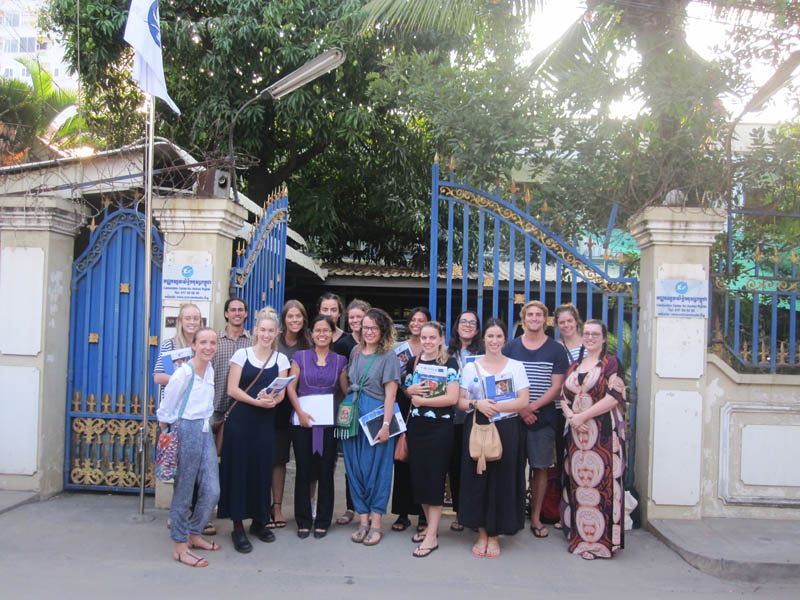
A visit to the Cambodian Centre for Human Rights
"During the visit to the Cambodian Centre for Human Rights (CCHR) we met one of the most courageous, intellectual and downright inspirational individuals I have ever encountered. Their Director actively engaged in discussion with us about their initiatives that expanded from their fundamental goal of protecting civil and political freedoms, including their Diversity Inclusion Programs for the LGBTI communities, their attempts for changes to be made to the Cambodian Judiciary, a Free Press and their Business and Human Rights campaign which advocated for large investment companies to incorporate human rights principles into their policies.
It was an eye opening experience to listen to the young Director speak of such programs and some of the current cases they were involved with concerning land relocation projects."
Georgia MacKay
“Visiting the CCHR really highlighted how a few people can work together, to fight the uphill battle that is a developing legal system. Hopefully I will be able to emulate Chak Sopheap’s and the whole of CCHR’s courage and dedication to protecting human rights at difficult moments in my own career.”
Christie Waldek
"The passion and drive the different NGOs showed us demonstrates how many Cambodians are dedicated to improving conditions and advancing the human rights of the marginalised"
Kendra Turner
One of the issues facing Cambodians is the relocation of communities as the Government undertakes infrastructure projects, often funded by the international community. However, those who have been relocated have found themselves living in poverty and with no (or very limited) access to health care, education and employment opportunities. One NGO, Equitable Cambodia, asked us to visit one of the communities affected by this relocation. The women of the community generously gave their time to speak with us. It was a harrowing experience to see the living conditions and to hear their stories:
“While it is possible to learn about land reclamation by reading, the understanding we gained from going to the railway resettlement site was so much more comprehensive. To see the living conditions and physical and emotional trauma of the victims provided a context that no reading could provide.”
Justine Ralph
Week 1 was not, however, all NGOs. An undeniable highlight of the trip was the visit to the final hearing of Case 002/2 at the Extraordinary Chambers in the Courts of Cambodia (the ECCC or Khmer Rouge Trials).
"The hearing we observed focused upon the necessity of a third trial for Case 002. Resource constraints were discussed at the hearing, as well as other factors such as the parties being too old or too ill to fully partake in the judicial process. The discussion between the prosecution and the defence made me wonder, how far should the court go to secure justice for the people of Cambodia?
The limitations of the court are outweighed by the need to send a clear message not only to the international community, but to future generations of Cambodians that its dark past must never be repeated and that there are serious consequences involved for individuals who choose to flout international law."
Chantelle Pereira

The Australian Embassy
At the Australian Embassy, students heard about the important work being undertaken in Cambodia – investment in health care of the poorest Cambodians being particularly important. They also were given personal advice on careers within the Australian Public Service.
"Visiting the Australian Embassy in the afternoon was like stepping back home - the familiar smells, nature, even the breeze.
My time at the Australian Embassy emphasised how invaluable immersion experiences are. The ability to hear from individuals who have started from the same position as you makes you feel that your career is achievable. Simply being surrounded by their knowledge and passion solidified my dream to work in aid development projects with the Australian government in an international capacity. Such career confirming moments are only possible when you are immersed in real environments."
Darcy Harwood
Week 2
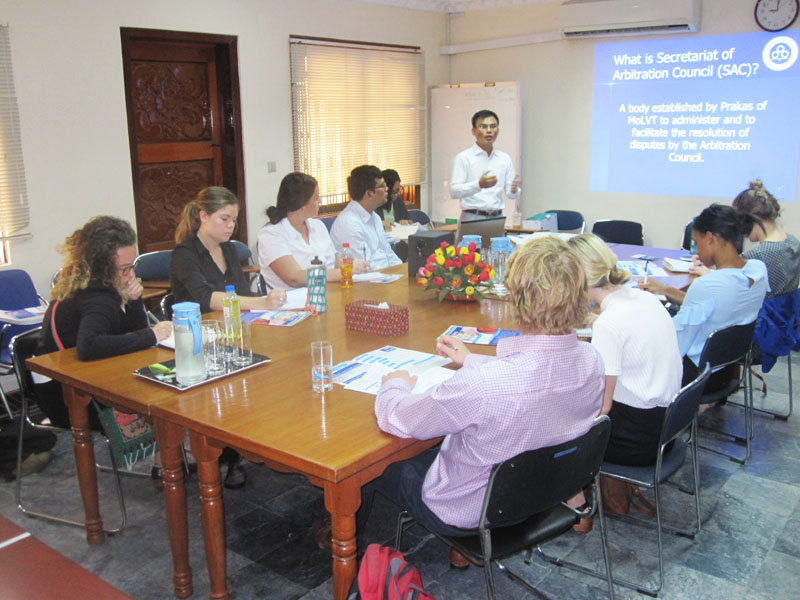
The LAC Group visiting the
Council of Arbitration for Labour
In the second week of the trip, Legal Aid Cambodia (LAC) and International Bridges of Justice (IBJ) hosted groups of eight students. Both organisations provide much needed legal services to disadvantaged Cambodians.
"Working with Legal Aid Cambodia (LAC) revealed to me the challenges Cambodian People face with their current legal system. Access to legal support and legal representation is vital in order for there to be justice. Many Cambodians are not aware of their lack of rights or where they can seek help. LAC aim to afford citizens these rights by providing accessible legal aid. It was a unique and eye opening experience to meet with them and the other organisations they are affiliated with."
Sophie Momber
“One session at Legal Aid Cambodia was spent researching different topics in pairs, this was something I really enjoyed …It was interesting to compare and contrast the tax law systems of Cambodia and Australia. It lent the conclusion that whilst laws may be similar, the different approach to implementation and enforcement in Cambodia creates a vastly different society.”
Morgan Lindsay
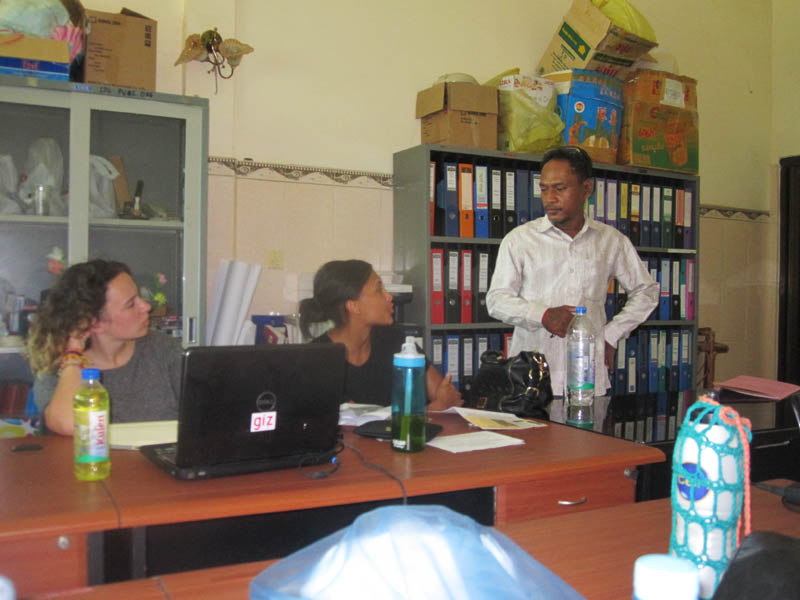
Working with LAC Staff
"I was able to attend the Kandal Provincial court to view IBJ represent a client in relation to drug charges: intent to sell and supply. This was an amazing experience as I was able to receive one on one tutorage from Sophea (our translator) and witness the application of an inquisitorial system (French influence).
The Provincial Court represents the equivalent of the Magistrates Court in WA. Visiting this court allowed me to compare the application of Cambodian law to that of Australia"
Emma McCracken
"The prison visit was an amazing experience that went beyond what I was expecting. To go in to the prison and be able to freely interview the client and ask first-hand what her struggles were was really eye opening. She freely discussed her daily struggles, fears and her personal and moral dilemmas with us as well as the legal issues she was facing.
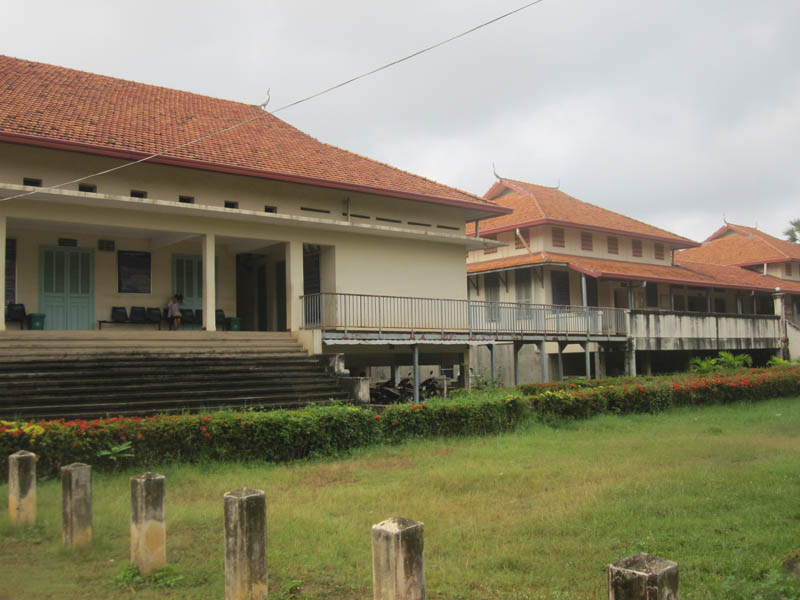
Kandal Provincial Court
Visiting the prison and interviewing the client allowed us an in depth understanding of the challenges to achieving justice within the Cambodian legal system as well as other legal issues (ie lack of funding.) The prison visit was one of the highlights of the trip for me as it allowed us to understand the reality of the legal issues and what they meant for prisoners. "
Madyson Butterly
“One task we were given at IBJ was to research any possible grant opportunities. I feel that this was one of the most useful things we could have done. It was not a trivial act or creating more work for anyone, and instead it helped IBJ address its major issue at the moment. Overall, our experience with IBJ was invaluable to our professional life and highlighted the practical difficulties of running an NGO in Cambodia.”
Rachel Porter
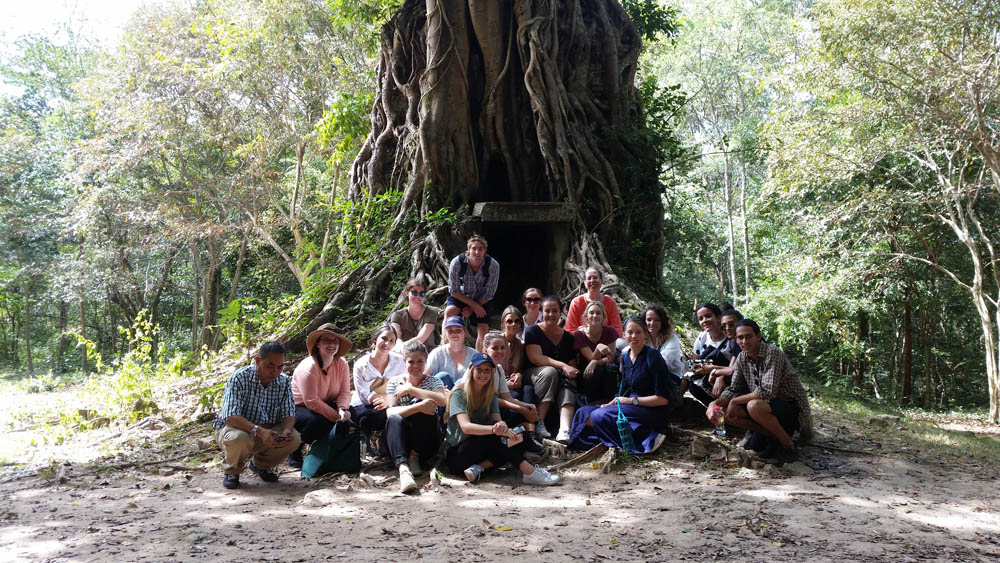
7th C AD Temple in Kampong Thom Province
On the final day the two groups combined to go 3 - 4 hours north to a rural village. The village had invited us to view a domestic violence/divorce conciliation. Out of respect for the parties we were unable to take photos during the conciliation we were there to observe...but did visit a 7th C temple complex and tried the local cuisine (spiders) along on the way.
Held in the open, in front of the leaders of the rural commune, the conciliation was very different from a 'family law' dispute in Australia:
"In observing the domestic violence conciliation, I had a realisation of how many of my concerns about the conciliation process came from my own expectation of how a dispute should be resolved in the Australian context. Most Khmer people we talked to had a positive attitude towards the process...Things that seem like they would never work in Australia seem to work in a different context."
Leah Vlatko

While the students learned a lot about international and domestic Cambodian Law, the lessons they took away from the trip went well beyond the ‘content’ of the unit:
"Whilst studying law I often forget to think of law from a global perspective. Law in Context Cambodia enabled me to gain invaluable experience in another country's legal system; such insight allowed me to actively compare legal systems, finding surprising similarities, but more importantly challenging some of the accepted norms within our own. The unit afforded me the opportunity to combine my two areas of academic interest (law and international relations) through a practical experience. This has given me more direction towards a future career."
Henry Prior

Connect with Notre Dame on Social Media
Australia
Fremantle
Broome
Sydney